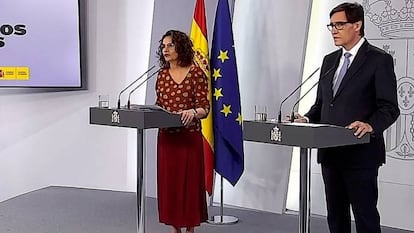Coronavirus daily death toll down to 56 in Spain
Government officials come out in defense of their deal with a Basque radical party and say there is no problem with street protests, as long as social-distancing rules are observed

The Spanish Health Ministry on Friday reported 56 overnight deaths from coronavirus, a figure that also takes into account fatalities in the last two days in Catalonia, which did not report its data on Thursday due “to a validation problem.”
There were 446 new infections detected with the more reliable PCR lab tests over the period, said the ministry. The total official death tally in Spain now stands at 28,628, with confirmed cases reaching 234,824. Spain has been recording fewer than 100 daily deaths for several days in a row, after reaching a peak in early April.
On Friday the Health Ministry announced which parts of Spain get to move to a new phase in the country’s gradual deescalation plan. The Madrid region is entering Phase 1 after its application was rejected twice. The Barcelona metropolitan area and the region of Castilla y León are also transitioning to Phase 1, while 47% of Spaniards will move to Phase 2.
Also on Friday, the Cabinet held an extraordinary meeting to approve the fifth extension to the state of alarm, after Prime Minister Pedro Sánchez of the Socialist Party (PSOE) secured congressional approval for it on Wednesday. The emergency powers will remain in place until June 7, although Sánchez wants to request one last two-week extension after that, to coincide with the end of the deescalation process.
Bildu row
The Cabinet meeting took place amid mounting controversy over a deal that the government struck with a Basque radical party named EH Bildu, in exchange for its abstention at the vote to extend the state of alarm. The wording of the deal, which was unveiled only after Congress had approved the renewed emergency powers, said the government would repeal a 2012 labor reform – which, among other measures, made sacking employees cheaper for firms – in its entirety.
The reaction by political parties, employer associations and other groups has led the Socialist Party to partially rectify and produce a new statement with vaguer wording. But its junior coalition partner Unidas Podemos continues to stand by the original deal, underscoring the tension between both governing partners.
The Popular Party (PP) wants Sánchez to appear before Congress to explain the deal with Bildu, a radical left coalition that has courted controversy in the past for failing to condemn the violent campaign waged by Basque terrorist group ETA, which has now disbanded. The PP has called on the PSOE to break that agreement “out of dignity.”
Protests

Finance Minister María Jesús Montero on Friday addressed allegations by right-of-center parties that the state of alarm is an excuse for the government to cling to its emergency powers and curtail citizens’ freedoms. Several street protests have been taking place in Madrid and in other parts of Spain in recent weeks, and the far-right party Vox has called demonstrations from vehicles for Saturday, which have been authorized by government officials.
This fact, said Montero, “shows that this is a country with the rule of law, where the only thing that the state of alarm is restricting is freedom of movement and association.”
Montero added that protests are not a problem as long as social-distancing rules are observed. The only freedom that does not exist, she said, “is the freedom to infect others.”
Small towns
On Friday, the Official State Gazette (BOE) published a ministerial order easing the confinement measures in municipalities with fewer than 10,000 residents. Regardless of which phase of the deescalation plan they are in, time slots for walks and exercising are being eliminated; more than one adult may go out with children, and indoor dining at restaurants will be allowed, as long as capacity limits are observed.
English version by Susana Urra.
Tu suscripción se está usando en otro dispositivo
¿Quieres añadir otro usuario a tu suscripción?
Si continúas leyendo en este dispositivo, no se podrá leer en el otro.
FlechaTu suscripción se está usando en otro dispositivo y solo puedes acceder a EL PAÍS desde un dispositivo a la vez.
Si quieres compartir tu cuenta, cambia tu suscripción a la modalidad Premium, así podrás añadir otro usuario. Cada uno accederá con su propia cuenta de email, lo que os permitirá personalizar vuestra experiencia en EL PAÍS.
¿Tienes una suscripción de empresa? Accede aquí para contratar más cuentas.
En el caso de no saber quién está usando tu cuenta, te recomendamos cambiar tu contraseña aquí.
Si decides continuar compartiendo tu cuenta, este mensaje se mostrará en tu dispositivo y en el de la otra persona que está usando tu cuenta de forma indefinida, afectando a tu experiencia de lectura. Puedes consultar aquí los términos y condiciones de la suscripción digital.









































